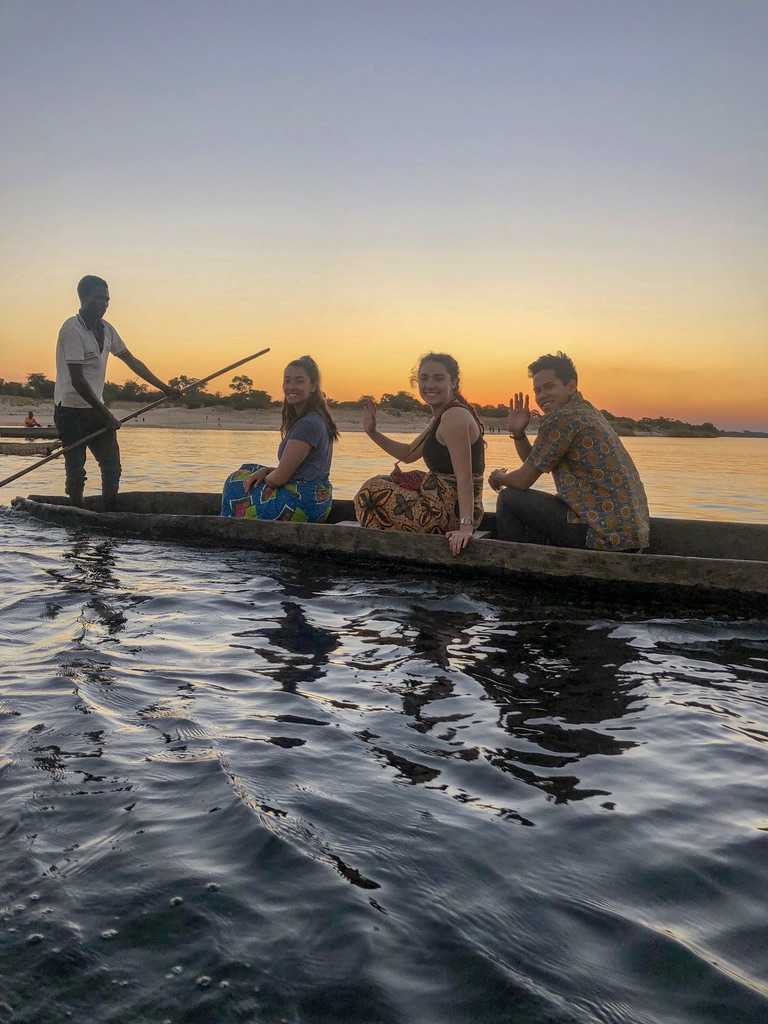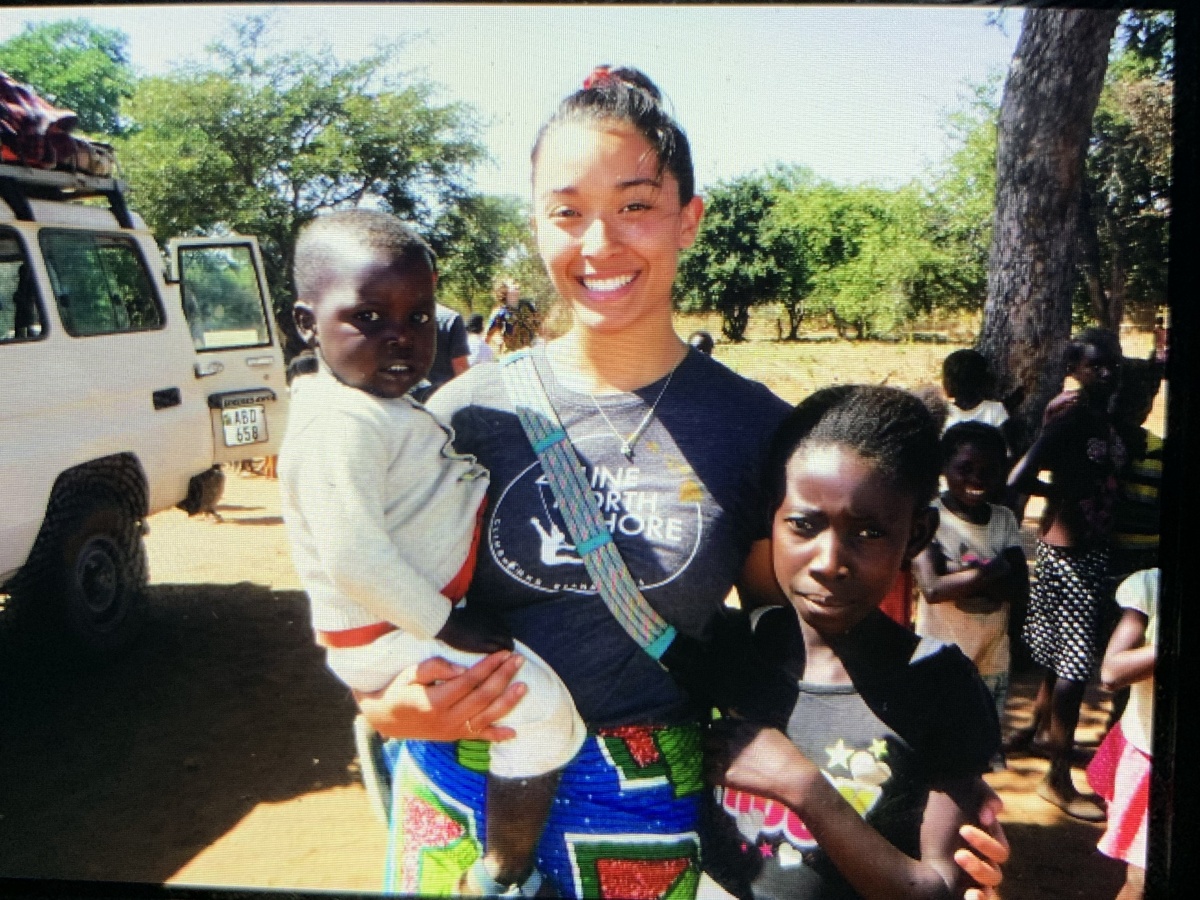
Our recent ventures during our concluding week in Zambezi have included visits to the beach, many meetings with various tailors around town, wrapping up class material, celebrating Annika’s birthday in stereotypical study abroad fashion, watching the sun set, and attending a traditional Makishi festival. Shout out to all of my classmates and leaders, who I admire so much, for going all in these past few days and taking full advantage of our last days in Zambia while somehow incorporating self-care and reflection.
When talking with Zambians, especially those whose English is limited, the word yes tends to come up a lot in conversation. It did not take me long to figure out that “Yes.” does not always mean yes. For example, many of the conversations I have had with children here, including Magis, Janet, Cecilia, Jen, Jane, Pricilla, Precious, and Meid, have gone something like this: “Hello! What is your name?” They look up at me through a sometimes beaming, sometimes shy smile. “My name is Precious.” “Do you go to school?” “Yes.” “Do you like school?” “Yes.” “What is your favorite subject in school?” “Yes.” “What grade are you in?” “Yes.” By this time, I realize that they probably are not understanding much of my English, so I ask a question I know they will say and mean yes to. “Do you want to play a game?” “Yes!”. The diverse bunch of Zambians I have had the privilege of interacting with on this trip all have unique stories and backgrounds, some of which I have gotten the chance to understand more thoroughly. I learned quickly that yes or no questions are not the best vehicle for truth. This goes beyond English proficiency and touches on the hot climate culture in which the Zambian people exist. In this type of culture, when the choice of an answer is between yes or no, the answer is almost always yes.
In our computers class, every student was required to put together a Power Point and present it in front of the class. The content of their presentations was based on a plethora of superficial questions about themselves and their lives. During our afternoon class yesterday, Kanyambi, a student of 66 years who I have come to admire very much, presented his Power Point. He touched on the immense poverty he was raised within and some of the struggles he faced due to this economic shortage. I felt much empathy and sadness. Have I seen profound suffering here? Yes. But, countering this suffering is a unique beauty that comes from the type of experience which builds resilience. There is a kindness and joy, the type that only comes from persistent, deep hope, that remains within and radiates off of Kanyambi and so many other Zambians. Their joy is not contingent on how much money they can hoard, their status in the community, or being the star consumer. They view life from a different paradigm that I cannot pretend to fully understand, but I can say that this opportunity to peak into their lives means the world to me.
Throughout the second week of computer classes, many people approached me asking if they could join late. One day during class, a man walked up to the back door and asked me if he could join the class. I informed him that we were at full capacity in all three classes and he had already missed half of the class periods which make up the course. In the middle of my delivery, I noticed him peering in to our classroom. I figured he was curious and interested in what class looked like and the information we were covering. After a few more seconds of staring past me, he asks if he can speak to the one in the hat. He was talking about Bryce, the only male instructor in the room. I informed him that Bryce would give him the same news I just had, but he insisted. Once Bryce delivered the same information, the man left. Have I experienced overt sexism in Zambezi that implies female inferiority and comes off as blatant disrespect? Yes. Are there many men in Zambezi who build up the women in their lives and understand that the defamation of one group leads to the denigration of humanity as a whole? Yes. An example of this can be seen in the way Debby, the coach for a youth development focused soccer league, lifts up his wife Eukaria. He encourages her to further her education and supports her ventures as a business woman as well (She makes and sells the best ice cream in Zambezi). From what I have seen, though I could be biased by my inclination towards romanticism, their love is pure, supportive, and equal. It is founded in a mutual respect and understanding of each other. I believe this type of respect and understanding would counteract the underlying values which perpetuate sexism in this culture. There is a similar strength I have recognized within many of the women of Zambezi, including Mama Love, Violet, Katendi, and Josephine that makes me question how so many of the men in this culture have not caught on to the fact that women’s capabilities go far beyond what they assume.
During our past three weeks in Zambezi, many of the women have experienced the unique discomfort that is cultivated through the unwanted touch or words of a man. In many cases, the actions of men in Zambezi have stricken the dignity and autonomy of the women on this trip. Do I periodically engage in relatively risky situations in an effort to reinstate my own dignity and autonomy? Yes. Does the fear of being taken advantage of persist in the back of my mind even while I strongly refuse to be controlled? Yes. Does hearing that well esteemed members of the community condemn the inappropriate behavior I, and my fellow classmates, have been subjected to make this fear disappear? No.
As our time in Zambezi comes to a close, I am reminded of a brother and sister pair I met in Dipalata two weeks ago, Roy and Meid. Though our time together was ever so short, I still think of them every day. A piece of my heart that I cannot get back is with them. Is it painful knowing that I will likely never see either of them again? Yes. The remnants of this heart fracture keep me wondering about what it will be like leaving Zambezi, knowing that my goodbyes are potentially permanent. A piece of me is saddened knowing that our time to leave has come because this place has just begun to feel like home.

“The footprints – marks we leave behind as we go about our busy lives – serve as a metaphor for the journey each of us takes during our time on this planet…The more I interacted daily with Livingstone’s people, both real and imagined, and left my own footprints in the sand, I found that this beautiful, unfamiliar land had begun to feel like home.” -Ruth Stanford.
We are all pushing through struggles and tensions trying to make the most of our last memories here in Zambezi!
Kisu Mwane,
Alea Chatman

Hey Alea, stay grounded and curious at the same time. Your “yes, and” approach is powerful. Kisu mwane, Kelen
–>Hi Jeff
Annika- We missed you at all of the graduation festivities! Alyssa is officially a graduate! Can’t wait for you to get home and hear about your adventures! Love you!
Beautifully heart-felt entry, Alea. Life is complicated, isn’t it?!! You are wondering what it will be like leaving Zambezi? Expect a huge range of emotion and embrace it all. This is what makes us wonderfully, amazingly, painfully human…feeling and loving deeply. And also expect the emotional roller-coaster to continue back home. The culture shock can be jarring and very unsettling. Transitioning back to the land of material excess and often, spiritual poverty, from a place of abject poverty and spiritual wealth can create a disconnect that is difficult to justify. Be patient with yourselves, sit with the turmoil, and trust that the spirit and love of God will make sense of it all. You are in my prayers as your journey back with stories we all can’t wait to hear!
Regina! Thanks for writing this for Alea and the whole team. These are wise words about reverse culture shock that we all end up experiencing in “reentry” into this crazy culture of ours. Team – please take her words to heart!
Jeff Kreiser
“A piece of me is saddened knowing that our time to leave has come because this place has just begun to feel like home.”
Alea, your writing is beautifully crafted and drew me into your experience in wonderful ways. Does the plunge into the culture of an African nation change you forever? Yes. Does it mature you and make your life more full and whole? Yes. Praying for the whole team to have a relationally and spiritually rich last few days in Zambezi.
Jeff Kreiser